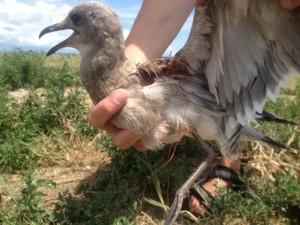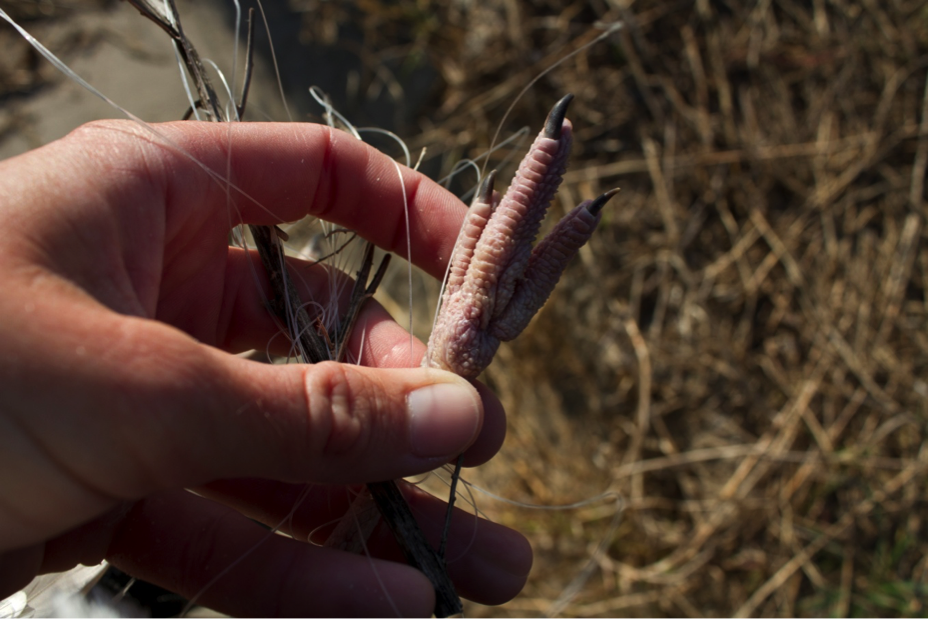For more than 25 years, Audubon North Carolina has managed a network of coastal sites along our state’s coast offering a haven for beach-nesting birds. By protecting the specialized habitats that birds need, coastal birds have a chance to thrive. Read on to learn more about nesting updates at the south end of Wrightsville Beach and the coastal team who protects them.
Please welcome guest-writer from Audubon’s Coastal Team Katharine Frazier.
With summertime comes fishing—for fishermen and hungry birds alike. Usually, birds and people fishing get along just fine (they’re going after different species of fish, after all) but when fishing line and birds intersect, dangerous complications can arise.
Becoming entangled in fishing line can lead to injuries and even death if the line is wrapped around a bird’s legs, bill or wings. Even if the entanglement is not tight enough to be fatal, it is still a serious and permanent impediment that can hinder a bird’s ability to hunt, forage and fly.
For nesting birds, this can have disastrous effects for their chicks. When a chick’s parent is trapped or killed by fishing line, the chick often dies of starvation because their parent can no longer provide food. Or, if the parent returns to the chick trailing fishing line, the chick could become entangled too.
Luckily there are ways we can help!
Take Precautionary Measures
The best way to help the birds is to prevent these dangerous situations from happening. Always dispose of your fishing line properly. Many boat ramps, fishing piers and beaches have receptacles for monofilament recycling, so make sure you locate one of them before you begin fishing. Place all braided line in the trash.
To be extra scrupulous, cut your line into short pieces before throwing it away or recycling it. Then, if it escapes from the trash, it will pose less of an entanglement threat to the birds in the area.
If You Catch a Bird…
If you happen to catch a bird while you’re fishing, it’s important that you do not cut the line. Cutting the line might seem easiest in the short term, but the remaining line tangled around the bird could catch on something else and affect the bird’s movements.
Start by gently reeling the bird in. Once you have the bird within reach, secure it with your hands or a towel by holding it firmly. To keep the bird calm, remember to cover its head. If you are helping a long-billed bird such as a pelican or egret, be sure to control the bill first. Then, fold the wings up naturally without wrenching the bird’s joints.
Pelicans are one of the more commonly caught birds, and though they may look large and imposing, they only weigh eight to ten pounds and cannot bite hard. The small hook at the end of their bill can scratch you, but does not pose a serious threat. Always be gentle, and remember to protect your eyes by wearing sunglasses or other eyewear.

After the bird is secured, determine whether or not it is hooked. If it is, push the barb all the way through, cut the barb off, and carefully back the hook out. If the bird is not hooked, simply untangle it and remove the line. Look closely to find all line, as it can easily disappear under feathers.
Assess the Damage
When the bird is free of all hooks and fishing line, make note of the bird’s condition. If the bird is not injured, you can release it. However, if you are unsure of the bird’s condition or if there are injuries present, call a licensed bird rehabilitator, who will treat the bird’s injuries until it is in releasable condition. You can find contact information for licensed rehabilitators by searching online via the North Carolina Wildlife Resource Commission’s website.
Prevent Fishing Line Fatalities

Fishing line is a serious problem for coastal birds, but following these steps will minimize its effects. As with any situation, though, it’s best to stop the problem before it starts. If a bird starts to dive on your bait while you’re fishing, stop and move to another spot. And next time you’re on the beach, be on the lookout for improperly discarded fishing line by the water and in the wrack line.
Who knows—with every piece you pick up, you could be saving a bird’s life!



